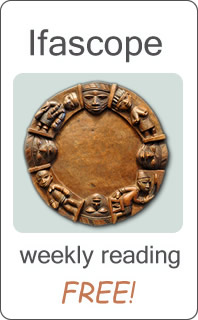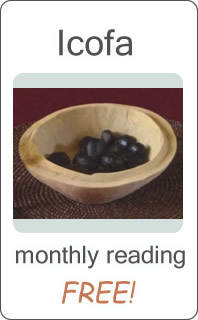active gardens
 Esu/Ellegua GardenEsu (also known as Eshu, Exu, Elegua or Elleggua)
Esu/Ellegua GardenEsu (also known as Eshu, Exu, Elegua or Elleggua)
Esu is the messenger who takes one's prayers and sacrifices to the foot of God in heaven.
Esu opens and closes the road or way for us in life. He stands in the crossroads and 4 corners. No ceremony is started without paying tribute to him first. He takes many forms and has many names. He is considered a trickster and can be a difficult teacher when there is a lesson needed to be learned.
 Obatala GardenObatala (also known as Popo, Akire, Oba, Ogiyan, Alase, Alaaja, Olufon)
Obatala GardenObatala (also known as Popo, Akire, Oba, Ogiyan, Alase, Alaaja, Olufon)
Obàtálá is the creator of human bodies, which were brought to life by Oludumare’s (God) breath. The owner of all Ori or heads. Sometimes called “king” of orisa.
 Osun/Oshun GardenOsun (also known as Oshun, Oschun, or Oxum)
Osun/Oshun GardenOsun (also known as Oshun, Oschun, or Oxum)
The Yoruba Goddess of love, beauty, marriage, and river. Osun is depicted as tall and beautiful, and she wears a mirror at her belt so that she can look at her own beauty. According to the Yoruba elders, Osun is the "unseen mother present at every gathering", because Osun is the Yoruba understanding of the cosmological forces of water, moisture, and attraction. Therefore, she is believed to be omnipresent and omnipotent. Her power is represented in another Yoruba proverb which reminds us that "no one is an enemy to water" and therefore everyone has need of and should respect and revere Osun, as well as her followers. Osun is the force of harmony. Harmony which we see as beauty, feel as love, and experience as ecstasy. She, according to the ancients, was the only female Irunmole amongst the original 16 sent from the spirit realm to create the world. As such, she is revered as "Yeye" - the great mother of us all. When the male Irunmole attempted to subjegate Oshun due to her femaleness, she removed her divine energy (called ase by the Yoruba) from the project of creating the world and all subsequent efforts at creation were in vain. It was not until visiting with the Supreme Being, Olodumare, and begging for Osun's pardon (as advised by Olodumare) that the world could continue to be created. But not before Osun had given birth to a son. This son became Elegba, the great conduit of ase in the Universe, the eternal and infernal trickster.
 Ogun GardenOgun (also known as: Ogoun, Ogun, Ogou, Ogum)
Ogun GardenOgun (also known as: Ogoun, Ogun, Ogou, Ogum)
The traditional warrior and is seen as a powerful deity of metal work, similar to Aresand Hephaestus in Greek mythology and Visvakarma in classical Hinduism. He is also prominently represented as Saint George in the syncretic traditions of contemporary Brazil. As such, Ogun is mighty, powerful and triumphal, yet is also known to exhibit the rage and destructiveness of the warrior whose strength and violence must not turn against the community he serves.
 Yemonja GardenYemonja (also known as: Yemoja, Yemaja, Yemowo, Yemanja)
Yemonja GardenYemonja (also known as: Yemoja, Yemaja, Yemowo, Yemanja)
She is the ocean, the essence of motherhood, and a protector of children. Yemonja is an orisa, originally of the Yoruba religion, who has become prominent in many Afro-American religions. Africans from what is now called Yorubaland brought Yemonja and a host of other deities/energy forces in nature with them when they were brought to the shores of the Americas as captives. She is the ocean, the essence of motherhood, and a protector of children.
 Sango/Chango GardenSango (Also known as: Shango, Chango)
Sango/Chango GardenSango (Also known as: Shango, Chango)
Known as the energy of thunder, the owner of duality, dancer and originally a human manifestation as a despotic general) perhaps one of the most popular Orisha; also known as the divinity of thunder and lightning, Sango is historically a royal ancestor of the Yoruba as was the third king of the Oyo Kingdom prior to his post-humous deification. In the Lukumí (Olokun mi = "my dear one") religion of the Caribbean, Shango is considered the center point of the religion as he represents the Oyo people of West Africa, the symbolic ancestors of the adherents of the faith. All the major initiation ceremonies (as performed in Cuba, Puerto Rico and Venezuela for the last few hundred years) are based on the traditional Shango ceremony of Ancient Oyo. This ceremony survived the Middle Passage and is considered to be the most complete to have arrived on Western shores. This variation of the Yoruba initiation ceremony became the basis of all Orisha initiations in the West.
 Oya GardenOya (also known as Yansa)
Oya GardenOya (also known as Yansa)
In Yoruba, the name Oya literally means "She Tore". She is known as Oya-Yansan, the "mother of nine." This is due to the Niger River (known to the Yoruba as the Oya) traditionally being known for nine tributaries. In Brazil, in Candomble, she is generally saluted with the phrase "Èpa heyi!. while in Cuban-derived Yórùbá traditions, the faithful often salute her by saying "Hekua hey Yansa."
Plus…The Sacred Phoenix, Aje, Nana Buuken, The Sacred Grove and much more! Experience the Energy!




